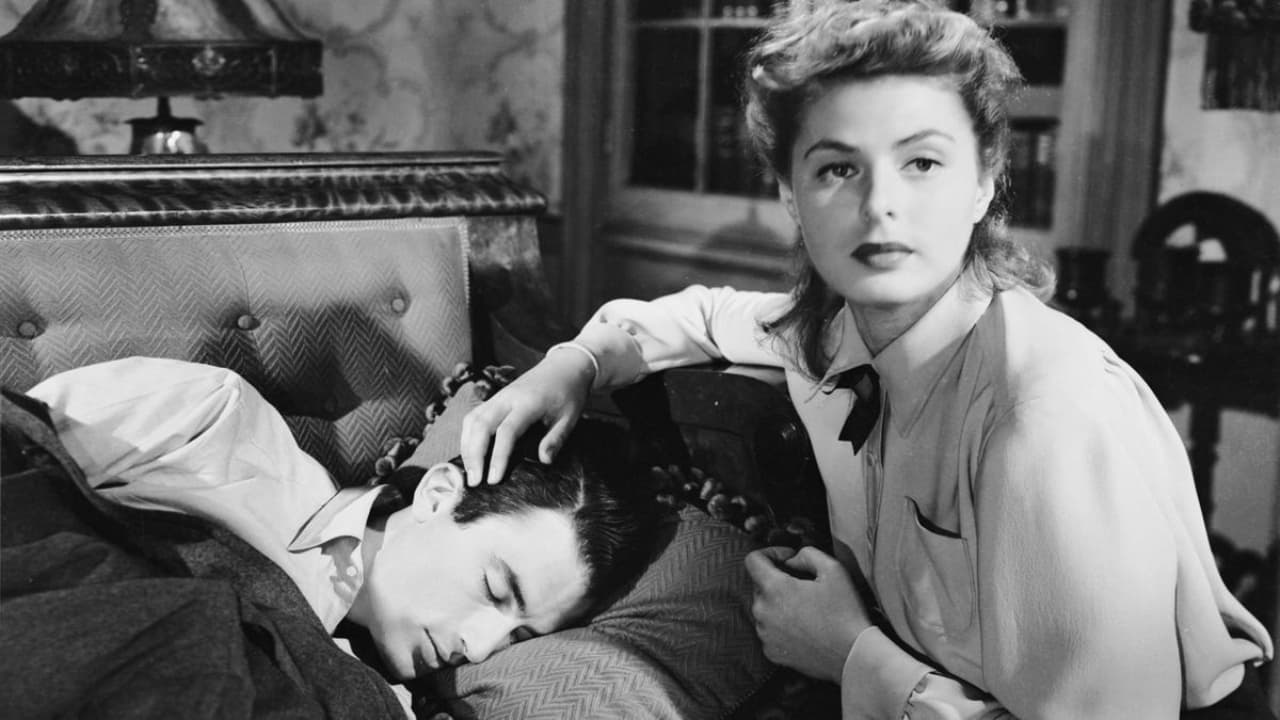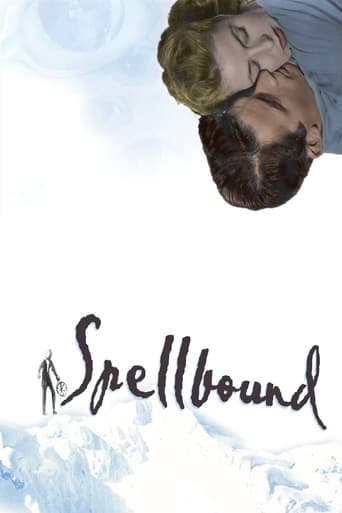Interesteg
What makes it different from others?
SteinMo
What a freaking movie. So many twists and turns. Absolutely intense from start to finish.
Neive Bellamy
Excellent and certainly provocative... If nothing else, the film is a real conversation starter.
Brennan Camacho
Mostly, the movie is committed to the value of a good time.
JohnHowardReid
In his excellent study of Ingrid Bergman for the Pyramid Illustrated History of the Movies series, Curtis F. Brown tells exactly what is wrong with Spellbound: "In addition to Gregory Peck's callow appearance and wooden acting, the film has other serious faults. One is its pretentious and simplistic 'dream sequence. Another is the dialogue." Most of the picture is thrown Bergman's way and she is such an accomplished actress and lights up the screen with such a charismatic inner radiance that it doesn't really matter what she says. The logical, pragmatic side of our brain is only half-listening. And as for Peck, for once his very shallowness and lack of presence is ideally suited for the part he is called upon to play. The support cast, led by Leo G. Carroll, is also sufficiently professional to either smooth out or neatly contrast the gauche acting of the amateurish Peck. Though why Michael Chekhov was honored with a Supporting Actor nomination is beyond me. Competent enough he certainly is, but he is among the least interesting of the supporting line-up. Other names that spring to mind well before Chekhov' are John Emery, Rhonda Fleming, Norman Lloyd and Wallace Ford. The Criterion DVD can be thoroughly recommended.
zkonedog
In this go-round, Alfred Hitchcock plays psychologist, as the themes/actions of the film revolve around a mental institution and a case of mistaken identity/amnesia.For a basic plot summary, "Spellbound" tells the story of Constance Petersen (Ingrid Bergman) and her new boss at the institution, played by Gregory Peck. Thrust together in a perplexing situation, the newly infatuated pair must piece together the mystery confound them. Saying anything more would severely spoil the twists and turns.As is usually the case with Hitch, this is a very solid, entertaining film. It's a bit slow (at least by today's standards) in the early goings, but the overall plot is engaging enough to keep you from tuning out early.The visuals, as also per Hitch, are up to the usual standard. A few scenes stand out as spectacular, while the entire film is generally visually impressive throughout. It was probably revolutionary for its time and still stands up well today.The acting is solid too, with Peck & Bergman doing what they do best and surrounded by an accomplished supporting cast.Thus, while perhaps not on the same level as "Vertigo" or "Psycho", "Spellbound" is just a notch or two below. It is entertaining, engaging, will make you think, and keep you guessing until the credits roll.
PimpinAinttEasy
To all closet male oglers, I was spellbound just looking at Ingrid Bergman who is at her most beautiful in this movie. The film can be watched simply to ogle at her. Peck looked young and wiry. He came across as younger than Bergman's character. The chemistry between them was great. The background score during the romantic scenes was very affecting.There is a role reversal in the film. Bergman plays the pivotal role (usually played by males) and it is she who is sexually attracted to Peck's mentally ill character and goes out her way at great personal risk to save him.There are the usual bunch of curious bit characters that you see in Hitch movies - the nymphomaniac at the beginning of the film who scratches film, the lecher at the hotel and Bergman's strange mentor who mouths weird dialogs like "any husband of Constance is my husband".There is a dream sequence designed by Dali. It was too arty for what was a pretty over the top film. The story and plot are preposterous, I wonder whether Hitch took it all too seriously. But the way Hitchcock directs it, its pretty entertaining.Not the best Hitchcock, but even when he's not at his best, it is very very watchable.The film begins and ends with the background score being played for a few minutes.Best Regards, Pimpin.(7/10)
vincentlynch-moonoi
For a number of reasons this is one of my favorite Hitchcock films.My review is based on the Blu Ray edition of the film, and let me begin by commenting about that. If you already have the DVD version, I don't think you're going to gain much by moving to the Blu Ray edition. Some have questioned whether Ingrid Bergman was an appropriate choice as a psychiatrist. I have no problems with her portrayal, in fact I rather enjoyed it. I also thought that she and Gregory Peck had great chemistry in this film...and of course, they did have a brief affair according to Peck after Bergman died.Gregory Peck is excellent here...as always. This was only Peck's fourth film, but he was already reaching the peak of his career with a number of strong performances around this time.Leo G. Carroll, one of Hitchcock's favorite supporting actors, is here, and I enjoyed his portrayal as the departing head of the psychiatric institution.Michael Chekhov is wonderful as the professor-mentor of Ingrid Bergman. It's a charming portrayal of an old-world psychiatrist.An interesting small part is played by Rhonda Fleming as a psychiatric patient who lusts over men but hates them.Of course, the highlight of the film is the dream sequence which was designed by Salvador Dali. Unfortunately in the final editing for release the almost 20 minute dream sequence was cut to about 2 minutes. Personally, my only real criticism about this film is that the balance between action suspense and dialog is decidedly on the side of dialog. However, it's good dialog. And, it's through memory flashes and dialog that Peck's character slowly begins to piece together the mystery in his life, It's really quite intriguing how Hitchcock very slowly and gradually leads the characters and the audience into discovering the truth. Incidentally, the musical score is excellent here, though rather repetitive. To me, at least, the ending was a surprise.I give this film an "8", albeit a weak "8". What puts it beyond a "7" for me is that the film is relatively unique, particularly for the mid-1940s.

